Goal factoring, reflecting on what I can do with my time, and enjoying a buffet of goals
Posted: - Modified: | planning, timeLucas Baker came across my Less Wrong meetup notes while looking for more information about goal factoring, a technique for analyzing your actions and goals in order to come up with better alternatives. I hadn't dug into it in much detail before, but since he was curious, I spent some time trying out goal factoring so that I could share more thoughts. Here are the resources I found useful:
- Sandy Maguire: Goal factoring
- Dee Stewart's templates
- Ben Kuhn's notes preparing for a presentation on goal factoring
I started by drawing different goals and their connections with each other. For example, I like learning more about tools and programming languages because that helps me build more tools and cool stuff, and that tickles my brain. It also gives me useful things to share, and that helps me make technical topics friendlier. Sharing also helps me connect with other people, which makes it easier for me to learn from different perspectives, which enables me to make better decisions. Many of my actions and goals support more than one goal, so I get a lot of value out of the time I spend.
I picked a set of goals and listed the actions that I frequently take towards those goals. I also brainstormed different actions that I could take or delegate. This was great because it helped me come up with more ideas for mini-projects or delegatable tasks. For example, a weekly Emacs tutorial might be fun and useful (and maybe I can even commission some of those). I can look into asking my assistants to interview me as a way of fleshing out particular post ideas, too.
One of the advantages of making a list of productive activities is that it's easy for me to switch from one good thing to another depending on my interest or energy. Since “Tickle my brain” turns out to be a totally acceptable goal (at least for me), I can give myself permission to spend one or two hours a day on tech learning. That had been neglected because of my focus on other activities. It's good to get back into tweaking my Emacs or learning more about NodeJS, though. I can get a little carried away doing this (flow can be dangerous!), so I limit my time. After about two hours each time (or maybe four, if I'm pushing it), I should resurface and check on the other activities I may need or want to do.
It's good to decide how much time I want to spend on other activities, too. For example, I want to work on delegation daily so that my assistants get prompt feedback and so that I keep filling the pipeline with more task ideas. I want to work on consulting enough so that projects and tasks keep moving, but I don't want it to take over peak creativity/attention time, so I move it off-peak whenever possible. Packaging (making PDFs and e-books, organizing and revising posts, recording and processing podcasts) takes time and isn't as engaging as the other activities, but it helps me connect with people, so I should do that weekly. I'll also see if I can delegate more packaging so that it gets done.
To make it easier to brainstorm delegation-related tasks, I pulled some out into a separate drawing. There's a lot of room for growth. =) I'm slowly getting used to having assistants do web research, and it turns out to be surprisingly useful. I probably read much faster than they do, but I benefit from the different perspectives and search words they use, and it's nice to ignore the fluff.
One of the templates for goal factoring encouraged you to analyze your current actions instead of getting lost in goals you think you should have. For my third attempt, I picked a few frequent actions and traced the connections to the goals they support. I brainstormed alternatives and compared the costs. The goals looked pretty similar to the first set, but a different perspective helped me identify other alternatives I can explore. For example, it might be a good idea for me to create a Trello board or update my public Org file with the things I'm curious about so that people can help me out.
What am I learning from this goal factoring exercise? It's a good excuse to brainstorm and examine alternative approaches for reaching my goals, especially in terms of identifying low-hanging fruit. I'm already used to explaining how my actions contribute to multiple goals and how my goals are related to each other. I occasionally talk to people about my big picture (or as I like to call them, my Evil Plans). The way I define my goals seems to be a little different from the way most people define theirs. Instead of having big goals and strong commitments, I have a lot of small goals with hardly any commitment aside from curiosity. This approach seems to fit me better, although I'm probably missing out on extra productivity. I like making lists of lots of little goals or possible actions, because that makes the low-hanging fruit easier to pick.
Reflecting on this led to exploring this metaphor of a buffet of goals. Influenced by Jim Collins' Good to Great, I set myself Big, Hairy, Audacious Goals (BHAGs) in 2005. “S.M.A.R.T.” was an even more common acronym for goal setting, and I tried those too. The meaning of S.M.A.R.T. varied. My mom's version was that goals should be Specific, Measurable, Ardently-desired, Realistic, and Timebound. (Specific, Measurable, Attainable, Relevant, and Timebound makes sense too.)
Time-boundedness was something that never quite caught fire with me, though. I think it's because I'd demonstrated “potential” at an early age (of the computer-whiz-kid sort), grown up with praise along the lines of “Wow, she can do all of this stuff and she's only ___ years old,” and nearly got caught up in the insecurities of looking over my shoulder or ahead of me at people who were doing even more awesome things at even younger ages. I remember consciously deciding, sometime in my teens, that I didn't want age or speed to be special. People made a lot of fuss over precocity — but at the same time, it seemed that age became an excuse for them to not learn or try. I pushed back at that. I preferred looking up to late bloomers like Grandma Moses rather than the “30 under 30” lists.
Self-imposed time-based deadlines–“I will do ____ before I turn 35”–echoed that old conflict for me. If a goal was intrinsically valuable, I would do it already motivated by the knowledge that life is short (memento mori!); and if I wasn't motivated enough to do it, I didn't want to set myself up to feel like a failure just because I accomplished it at an older age instead of the goal I'd optimistically set.
So I've been moving away from goals with deadlines. I wrote a blog post about that in 2012, but I've been thinking that way for a while now, and I'm coming to a clearer understanding. I want to embrace my goals and move towards them as a whole, motivated person, not split myself into taskmaster versus slave. I want to move towards my goals out of interest and curiosity and wonder. Dates might work for other people, but not quite for me.
What do I replace that metaphor with, then? I think of having a buffet of goals stretching infinitely before me. I can choose the portions I want. I can enjoy a variety of tastes, textures, and cuisines. I don't have to overload my plate or stuff my stomach. I can graze. I can go back for more. As I nibble, I can think about what else I want to try, or how I want to tweak things, or if I want to rearrange the dishes for greater convenience. I like it. It's a fun metaphor. =)
So, coming back to goal factoring… What's next? More goal analysis! As it turns out, it's easy to combine Emacs Org Mode and GraphViz. I've started documenting my actions and goals in Org Mode. I hope org-babel will make it easy to slice the goals into different sets and produce intelligible graphs. You can check out the first attempt. It's very rough, but it will get better over time. =)

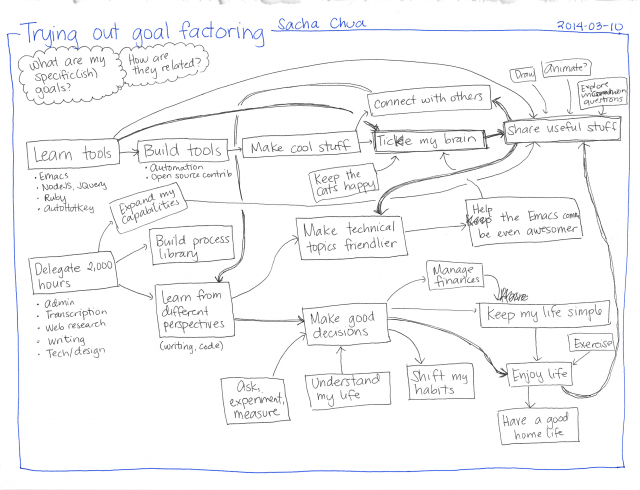
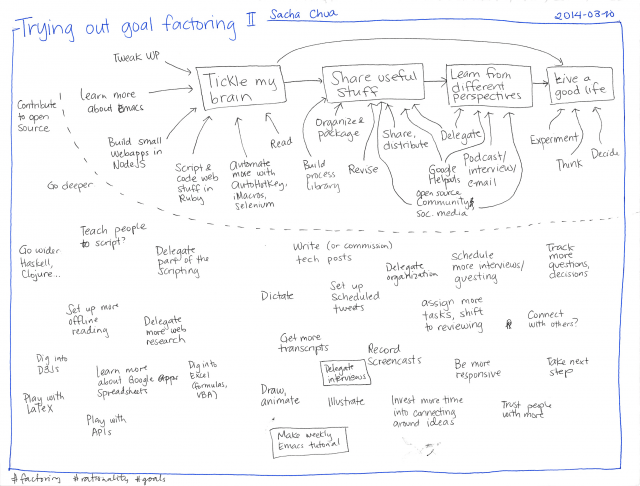
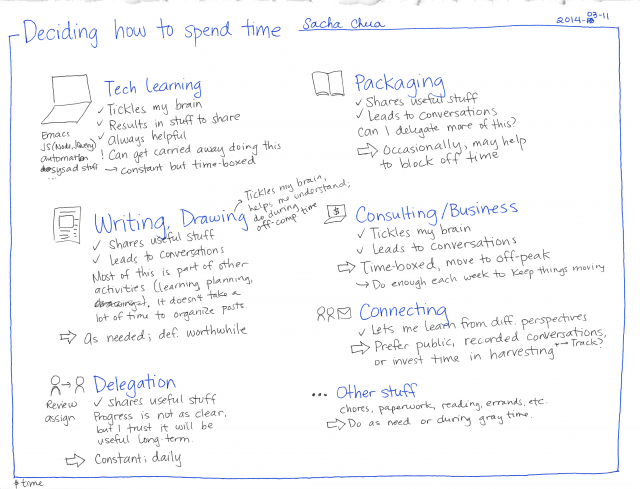
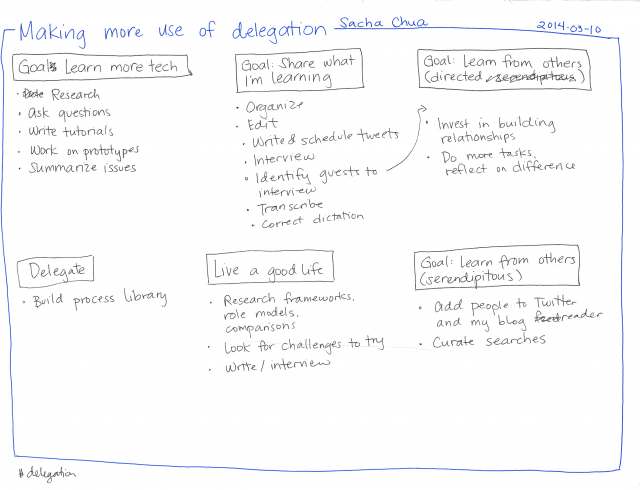
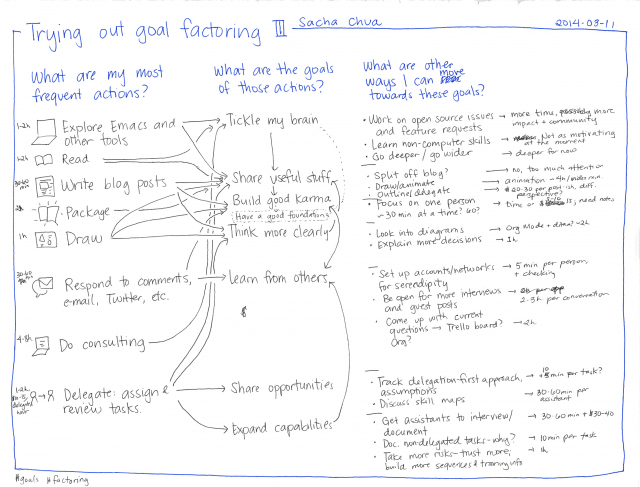
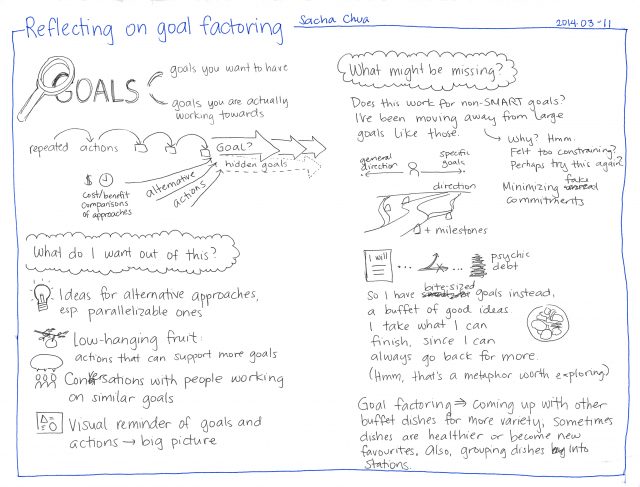
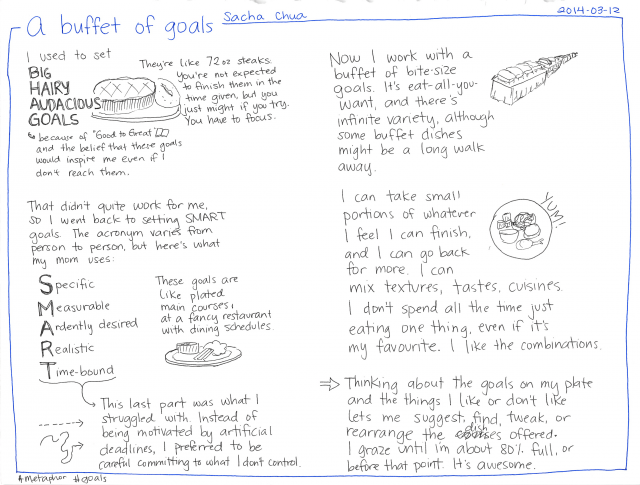
5 comments
Kenneth Bruskiewicz
2015-11-25T19:30:48ZHey Sacha,
It was kind of amusing to see you post Dee's template. I was pretty interested in this kind of thing, using Emacs to keep track of goals, as you see in the thread. Looks like things have gone full circle. Thanks for the help and showing that Emacs and graphs is Actually a Good Idea!
sachac
2015-11-27T02:45:30ZEmacs + graphs = awesome. Have you come across http://doc.norang.ca/org-mo... yet? Aside from the Graphviz example I linked to in my post, there's also other good stuff with PlantUML and other tools. =)
Kenneth Bruskiewicz
2015-11-29T04:18:04ZI have, but it was such a think document that I think I missed that part the first time!
You might enjoy this video by the Connection Theory folk on how they expect goal-factoring to be useful from the perspective of CT: https://vimeo.com/47903883
sachac
2015-11-30T19:08:37ZThat's some map! =)
curtis gagliardi
2016-01-11T03:04:40ZThe broken link to Sandy Maguire's article is available on the wayback machine: https://web.archive.org/web...